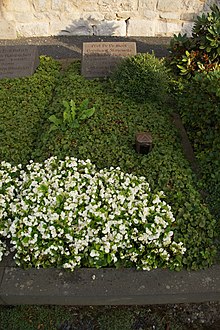Bernhard Stasiewski
Bernhard Stasiewski (born November 14, 1905 in Rixdorf ; † July 1, 1995 in Ittenbach ) was a German Catholic priest, church historian and Eastern European historian .
Live and act
Bernhard (Clemens) Stasiewski was born on November 14, 1905 in Rixdorf, later Berlin-Neukölln, as the oldest of 11 children. His parents came from West Prussia , and his father was a cemetery inspector in Berlin-Neukölln for many decades. Stasiewski attended the Kaiser-Friedrich-Realgymnasium in Neukölln, where he passed the Abitur in 1924. As Breslauer seminarian studying in Wroclaw theology and philosophy, was on 27 January 1929 priests ordained and on 18 February 1929 licentiate doctorate of theology. After brief activity as a chaplain in Nauen and Berlin, he studied history, art history and Slavic studies at the Berlin University . He had already learned Polish in the seminary in order to be able to work in the pastoral care of Poland on behalf of the Archbishop of Wroclaw, Adolf Bertram . His research interests, the East German and Eastern European church and secular history was accordingly in 1932 with a thesis on the subject of studies on three sources to the oldest history of Poland Dr. phil. PhD .
Stasiewski already learned Polish intensively in the Breslau seminary, which was not unusual given the pastoral care in the bilingual regions of Upper Silesia and the seasonal workers in Brandenburg and Western Pomerania. His Berlin studies brought him increasingly into contact with the history of the German Eastern Territories and Eastern Europe. Among other things, he heard the Russia expert Otto Hoetzsch and the Nestor of the "German East Research" Albert Brackmann . With his proof of the first Christianization of Poland via Bohemia instead of Germany, he opposed the then prevailing doctrine.
From 1961 he held a lectureship at the Catholic Theological Faculty of the University of Bonn and in November 1962 took over the newly established chair for modern and contemporary church history and the church history of Eastern Europe. Since 1970 he has been a member of the Historical Commission for East and West Prussian State Research . After his retirement in 1974, he held lectures on church history at the St. Lambert College for Late Workers in Lantershofen until 1987 .
literature
- Gabriel Adriányi : Bernhard Stasiewski (1905-1995). In: Historisches Jahrbuch 116 (1996), pp. 297–299.
- Reimund Haas, Stefan Samerski , Eric W. Steinhauer (eds.): Bernhard Stasiewski (1905–1995) - Eastern European historian and science organizer (= Theology and University series. Issue 3). Monsenstein and Vannerdat, Münster 2007, ISBN 978-3-86582-435-6 . Digitized
- Hans-Jürgen Karp : On church history research in people's Poland. Bernhard Stasiewski on his 70th birthday on November 14, 1975. Self-published, Marburg 1975.
Web links
- Literature by and about Bernhard Stasiewski in the catalog of the German National Library
- Stasiewski, Bernhard . In: East German Biography (Kulturportal West-Ost)
| personal data | |
|---|---|
| SURNAME | Stasiewski, Bernhard |
| BRIEF DESCRIPTION | German theologian and historian |
| DATE OF BIRTH | November 14, 1905 |
| PLACE OF BIRTH | Rixdorf |
| DATE OF DEATH | July 1, 1995 |
| Place of death | Ittenbach |
